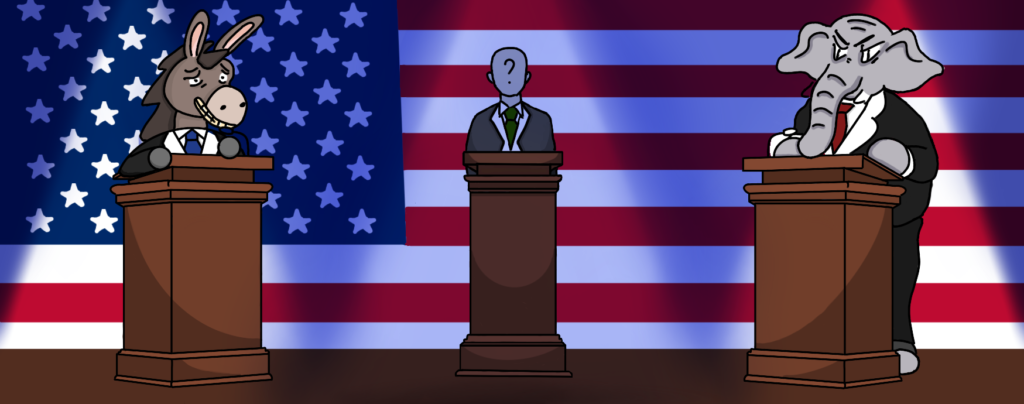By Vincent Ramos
Staff Writer

Duverger’s law is a political theory that states the winner-takes-all rule in an election leads to a dominating two-party system in a nation’s politics. The rule then inevitably causes the eradication of all third parties in legislation. The United States electoral system is an example.
Every four years the country rolls into election season, but instead of having an election where voters can choose from an array of candidates from all over the political spectrum, they’re forced to face a dangerously polarizing dilemma.
The 2016 and 2020 elections split the country in half, politically. It was one or the other and both sides hated each other. Still, in the 2024 election, polarization is a prevalent theme. Despite this, voters from both parties sought an alternative to Trump and Biden. Although the Democrats switched out Biden for Harris, Americans still want more choices. Funnily enough, there are other choices but unfortunately, they’ll practically never win. Although you may have never heard of Jill Stein from the Green Party or Chase Oliver from the Libertarian Party, the problem isn’t enough exposure or funding for third-party candidates, it’s the election itself.
Ever since the mid-1800s, the Republican and Democratic parties dominated legislature and politics, shaping the political system to be two-party. Throughout the years, third-party candidates like George Wallace in 1968, Ross Perot in 1992, and even Democrat-turned-independent candidate Robert F. Kennedy Jr. in 2024 became legitimate candidates to win the presidency. Yet, the candidates only ended up being a liability to another candidate. This is called the spoiler effect and it’s why a voter is discouraged from supporting the less popular third-party candidates since they know it’s virtually impossible for them to win, impelling voters to choose either the Republican or Democratic candidate.
The American electoral system is so flawed and frustratingly constricted, and the winner-takes-all rule is the reason. The election results are interpreted as whichever party has more votes in the Electoral College than any other party wins. So, if candidate one and two won 30%, and candidate three won 40%, candidate three wins. The issue is that candidate three won even though they didn’t win the majority.
For the election to be fair and diverse, the entire voting method must change. The solution is called ranked-choice voting and it’s used sparsely throughout America for local and state elections. However, Maine became the first state that implemented a ranked-choice voting system for a presidential election in 2020 and Alaska followed suit, approving ranked-choice voting for all general elections in 2022.
For ranked-choice voting, voters rank all the candidates based on preference on each ballot. The ballots are then counted in rounds because ranked-choice voting usually causes close rulings and ties, where candidates need to be eliminated based on their percentage of votes. To win, a candidate must surpass the threshold of 50%. If all candidates fail to reach it, the candidate with the lowest percentage is eliminated. If one voted for that candidate, the vote would pass on to their next choice. This process continues until a winner is found.
The rest of the 48 states must follow in Maine and Alaska’s footsteps in this groundbreaking change. Ranked-choice voting destroys the spoiler effect and levels the playing field for third-party candidates. Also, since voters won’t be voting for a party anymore, candidates ought to run honest campaigns and the dramatic theatre that plagues American politics today would finally end. Ranked-choice voting is already evidently promoting diversity. In the first ranked-choice voting election, Alaska was able to elect its first Alaskan native woman to Congress as a U.S. Representative.
For nearly two centuries, the Electoral College has consistently elected either a Republican or Democratic president. Contemporary American politics is the way it is because of the two-party system. Some would argue not to fix what’s not broken but take a look at what has happened this election. A candidate got shot, the Democratic party turned on their incumbent and conservative think tanks attempted to establish a fascist regime with Trump at its center. Extreme polarization has led the American people to adopt extreme political ideals and cause candidates to base campaigns on their hate for other candidates. As candidates grow increasingly more untrustworthy, unfit and even unhinged, we grow closer to electing someone who might destroy our country.
Regrettably, the process of changing said system is quite difficult. Non-profit organizations like Fair Vote and California RCV work to promote awareness and support for ranked choice voting but ultimately, the decision is up to the state legislators. As regular citizens, there’s not much we can really do legislatively besides sign a petition. However, the reason why the two-party system has dominated for so long is because voters aren’t aware of other systems. The extremely partisan American government has limited our choices and controlled our democracy for far too long. Knowledge is power and once the benefits of ranked-choice voting are common knowledge for American voters, our democracy will be saved.
